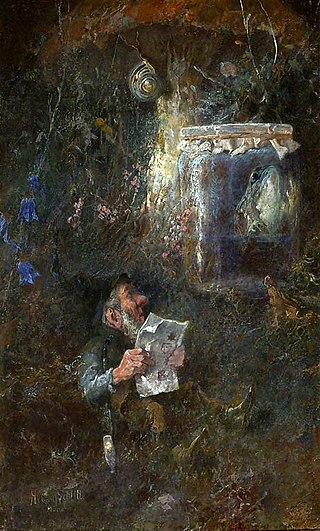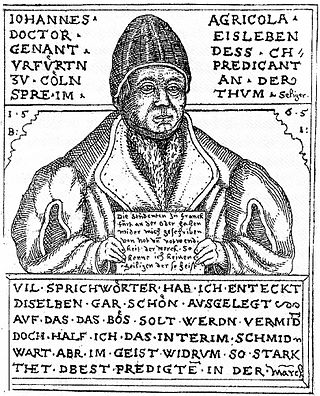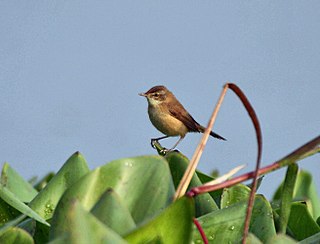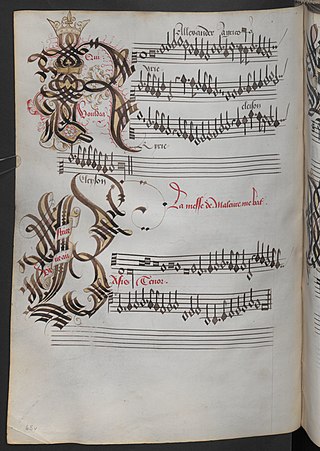
A gnome is a mythological creature and diminutive spirit in Renaissance magic and alchemy, introduced by Paracelsus in the 16th century and widely adopted by authors, including those of modern fantasy literature. They are typically depicted as small humanoids who live underground. Gnome characteristics are reinterpreted to suit various storytellers and artists.

Gnaeus Julius Agricola was a Roman general and politician responsible for much of the Roman conquest of Britain. Born to a political family of senatorial rank, Agricola began his military career as a military tribune under governor Gaius Suetonius Paulinus. In his subsequent career, he served in a variety of political positions in Rome. In 64, he was appointed quaestor in Asia province. Two years later, he was appointed Plebeian Tribune, and in 68, he was made praetor. During the Year of the Four Emperors in 69, he supported Vespasian, general of the Syrian army, in his bid for the throne.

Georgius Agricola was a German Humanist scholar, mineralogist and metallurgist. Born in the small town of Glauchau, in the Electorate of Saxony of the Holy Roman Empire, he was broadly educated, but took a particular interest in the mining and refining of metals. He was the first to drop the Arabic definite article al-, exclusively writing chymia and chymista in describing activity that we today would characterize as chemical or alchemical, giving chemistry its modern name. For his groundbreaking work De Natura Fossilium published in 1546, he is generally referred to as the father of mineralogy and the founder of geology as a scientific discipline.
Johann Friedrich Agricola was a German composer, organist, singer, pedagogue, and writer on music. He sometimes wrote under the pseudonym Flavio Anicio Olibrio.

Johann or Johannes Agricola was a German Protestant Reformer during the Protestant Reformation. He was a follower and friend of Martin Luther, who became his antagonist in the matter of the binding obligation of the law on Christians.
Martin Agricola was a German composer of Renaissance music and a music theorist.

Rodolphus Agricola was a Dutch humanist of the Northern Low Countries, famous for his knowledge of Latin and Greek. He was an educator, musician, builder of church organs, a poet in Latin and the vernacular, a diplomat, a boxer and a Hebrew scholar towards the end of his life. Today, he is best known as the author of De inventione dialectica, the father of Northern European humanism and a zealous anti-scholastic in the late fifteenth century.

The Roman conquest of Britain was the Roman Empire's conquest of most of the island of Britain, which was inhabited by the Celtic Britons. It began in earnest in AD 43 under Emperor Claudius, and was largely completed in the southern half of Britain by AD 87, when the Stanegate was established. The conquered territory became the Roman province of Britannia. Attempts to conquer northern Britain (Caledonia) in the following centuries were not successful.

Mikael Agricola was a Finnish Lutheran clergyman who became the de facto founder of literary Finnish and a prominent proponent of the Protestant Reformation in Sweden, including Finland, which was a Swedish territory at the time. He is often called the "father of literary Finnish".

The paddyfield warbler is a species of marsh warbler. It was formerly included in the "Old World warbler" assemblage. The Manchurian reed warbler was included in A. agricola as a subspecies.

Alexander Agricola was a Netherlandish composer of the Renaissance writing in the Franco-Flemish style. A prominent member of the Grande chapelle, the Habsburg musical establishment, he was a renowned composer in the years around 1500, and his music was widely distributed throughout Europe. He composed music in all of the important sacred and secular styles of the time.
The Agricola is a book by the Roman writer, Tacitus, written c. AD 98. The work recounts the life of his father-in-law Gnaeus Julius Agricola, an eminent Roman general and Governor of Britain from AD 77/78 – 83/84. It also covers the geography and ethnography of ancient Britain.

De re metallica is a book in Latin cataloguing the state of the art of mining, refining, and smelting metals, published a year posthumously in 1556 due to a delay in preparing woodcuts for the text. The author was Georg Bauer, whose pen name was the Latinized Georgius Agricola. The book remained the authoritative text on mining for 180 years after its publication. It was also an important chemistry text for the period and is significant in the history of chemistry.

Agrícola Oriental is a metro station on Line A of the Mexico City Metro system. It is located in the Iztacalco municipality. In 2019, the station had an average ridership of 11,317 passengers per day, making it the least used station in Line A.

Publius Cornelius Tacitus, known simply as Tacitus, was a Roman historian and politician. Tacitus is widely regarded as one of the greatest Roman historians by modern scholars.
AGRICOLA is an online database created and maintained by the United States National Agricultural Library of the United States Department of Agriculture.

Mikael Agricola Church is a Lutheran church located in the Punavuori district of Helsinki, Finland. It was designed by Lars Sonck and built between 1933 and 1935. The church was inaugurated on 14 April 1935. It is named after bishop Mikael Agricola.
Banca Agricola Popolare di Ragusa S.C.p.A. is an Italian cooperative bank based in Ragusa, Sicily.

Saddington Reservoir is a canal reservoir and 19.1 hectares biological Site of Special Scientific Interest south of Saddington in Leicestershire. The reservoir was built between 1793 and 1797 to supply water to the Grand Union canal.

Cheldon is a village and former civil parish, 17 miles (27 km) north-west of Exeter, now in the parish of Chulmleigh, in the North Devon district, in the county of Devon, England. In 1961, the parish had a population of 32.















